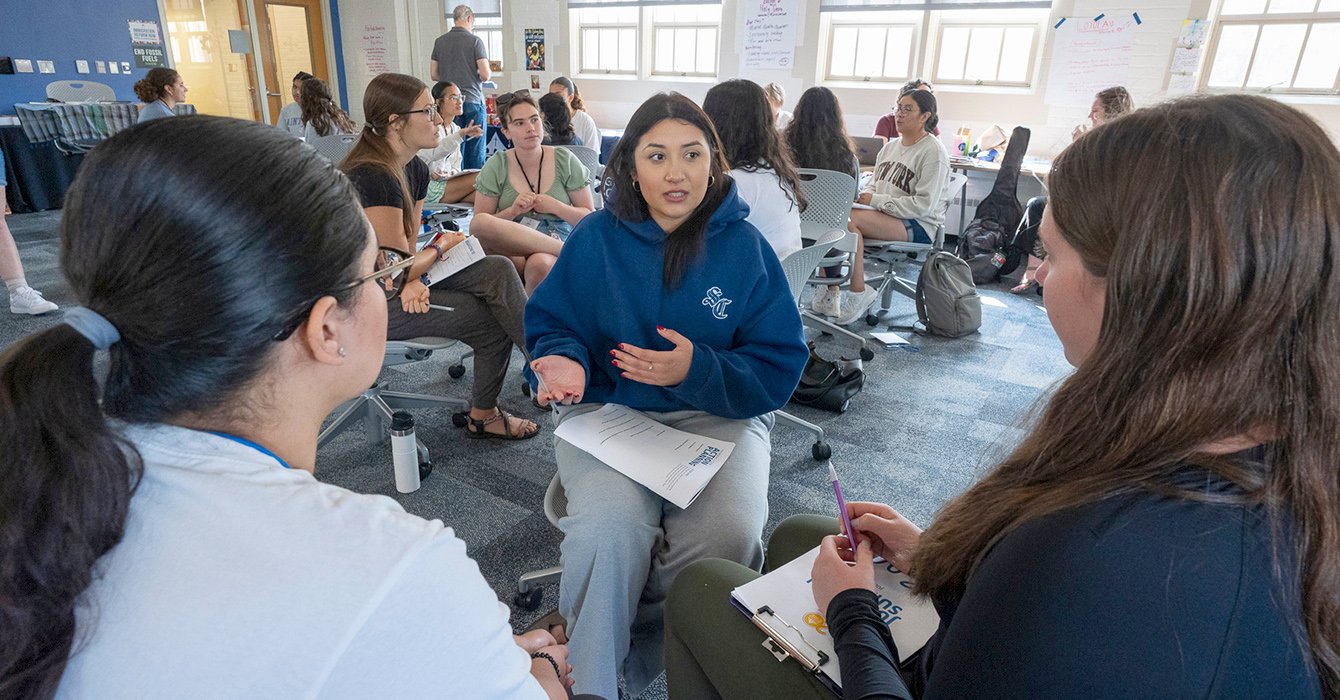The summer of 2024 was coming up fast when Vivian Smith, then a sophomore at the University of Alabama at Birmingham, lamented to a friend that she had no firm plans. Her heart felt pulled in two seemingly divergent directions, and she wasn’t sure which path to pursue: A devout Christian who’d worked in children’s ministry, Smith felt called to serve the Lord. But being outdoors was her favorite thing to do, and she longed to spend a season in a national park.
“Have you heard of ACMNP?” her friend asked.

ACMNP — A Christian Ministry in the National Parks — has been training young people to engage in relational ministry in national parks for almost 75 years. But this was the first time Smith had heard of it.
“I think I went that night and read the website — like the whole website,” said Smith, who prayed about it before applying and ultimately serving in Virginia’s Shenandoah National Park.
“That summer was so much bigger than I expected it to be,” said Smith, now a senior kinesiology and psychology major. “Everything I thought I was going to get out of it, it far exceeded.”
Amy Kennedy and David Degler, co-executive directors of the Colorado-based ACMNP, hear that a lot. Each year, their small staff evaluates hundreds of applicants, ultimately choosing 150 to 200 young people to serve in 45 national parks from Alaska to the Virgin Islands during a summer or winter season. Team members receive a small salary and room and board (at a minimal cost) in return for working with the park’s concessionaires, traditionally in entry-level hospitality jobs. And they lead Sunday services for park visitors and employees, often in iconic outdoor settings.
What ministries do you know that equip and deploy young people in ministry? What is the long-term result?

Even as the national parks face challenges due to staffing cuts and unstable federal funding, ACMNP’s relational ministry remains unchanged, often happening spontaneously. In a quiet moment, a seasonal co-worker shares about estrangement from their family. On a mountain ridge, a fellow hiker wonders aloud how the sunset can be so beautiful in a world that feels so ugly. On a drive to a local grocery store, a colleague acknowledges a struggle with substance use.
“The question is, How is God using you in the park? We want them to be alert to opportunities to have an impactful interaction that goes beyond the superficial,” said Degler, who joined the staff in 2012.
In training before the season begins, members learn how to listen without judgment, share their faith testimonies, organize a Sunday service and extend the love of Christ to those around them, sometimes just by washing dishes, cleaning tables or serving coffee. Participants are encouraged to create opportunities to build community in the parks, particularly for transient seasonal workers who may be living on the margins.
“What we’re doing is helping people see that ministry is all around you, all the time,” said Kennedy, who served as a ministry team member while in college before joining the ACMNP staff in 2011.

Where do visitors pass through your area? Who is serving them, and how are those serving ministered to?
75 years in the parks
ACMNP’s origin story begins in 1951, when founder Warren Ost, then a Princeton Theological Seminary student working in Yellowstone for the summer, led an interdenominational worship service in the bar of the Old Faithful Inn. He would go on to serve as ACMNP’s executive director for 45 years. The organization, originally supported by the National Council of Churches, registered as an independent nonprofit in 1971.
The day-to-day business is handled largely by six full-time staff members and one part-timer, while a board of directors oversees the organization’s fiduciary responsibilities, and a national advisory council meets regularly to address challenges related to recruitment, retention and ministry team experiences. The program boasts over 17,000 alumni, many of whom volunteer in supportive roles.
The bulk of its budget, about $1.2 million this year, comes from fundraising, though participants pay $350 for training and cover the cost of their transportation to and from their assignment. Each year, 10 to 15 individuals are chosen to participate in ACMNP’s Advanced Leadership Development Program, which comes with extra coaching, a leadership assessment and the potential for a scholarship. In return, participants are expected to spearhead a ministry project in their park that could have lasting results.
ACMNP is a Christian leadership development program, but its unique backdrop amid some of creation’s most breathtaking and unpredictable vistas sets it apart, Degler said. There’s often no orchestrating what happens in that space — a bear could wander into an outdoor service, or the heavens might open during a midday hike.
What is the origin story of your organization? How has the organization evolved over time?

“When there’s an experience that happens in a church, it can be wonderful. But when that same experience happens outside, whatever truth you’re hearing, there’s just that visceral experience with nature that impresses those truths on you in a way you can’t get anywhere else,” Degler said.
Mindful of God’s presence
For Smith, that experience quickly turned into a lesson on relinquishing control. As part of the Advanced Leadership Development Program, she had carefully mapped out a slate of hiking trips and “adventuring” activities to lead at Shenandoah, where she expected to join two teammates.
But a serious bout of pneumonia left her bedridden, delaying her arrival by two weeks. Hiking was out of the question — she was initially too exhausted — and her team had evaporated. One was reassigned to a different park, and another had deemed the dorms too sparse and returned home. Smith felt like she’d created this beautiful piece of pottery full of meaningful experiences, only to watch it crumble.
“I was walking toward the Lord with that vase, and someone knocked me down and it broke. I was like, ‘Lord, now I don’t know what to give you,’” she said. “As the park season continued, I spent a lot of time listening to God and what he says about his plans versus our plans. And he didn’t need that vase. He needed those little broken pieces, those shards of glass, and he painted a mosaic with that.”

What did you learn the first time all your plans fell apart? How have such lessons stayed with you?
Smith’s job that summer was running the front desk at Shenandoah's Big Meadows Lodge. Low on energy at first, she spent much of her downtime sitting outside, painting, journaling or playing her guitar. All created opportunities for her colleagues to approach her and start conversations.
During an impromptu painting session, one of her co-workers shared about pain she was going through with her family. Another picked up Smith’s guitar and played a tune his grandfather had taught him, then shared complex feelings about the two becoming estranged.
Smith had learned the concept of “praying through conversations” during her training — being mindful of God’s presence during interactions with others and encouraging them to share what’s on their heart. She quickly realized that many of her fellow seasonal workers were struggling with personal challenges.
“So by sitting and listening, it gave an opportunity for someone to become known,” Smith said. “It opened up this opportunity to listen and to offer encouragement that it doesn’t always have to be this way.”
Yoko Hashino, a seminary student at Trinity Evangelical Divinity School in Illinois, said she experienced something similar last summer serving at Voyageurs National Park in northern Minnesota. Some of her housekeeping colleagues shared that they felt rejected by the church or that they didn’t feel holy enough to have a relationship with God, a myth she tried to dispel.

The ministry is not about proselytizing or saving souls, an effort that can come across as “arrogant and offensive,” she said. It’s about forging genuine friendships and then sharing how your faith has impacted your life.
“We respect each other first, we like each other first, so when I say what I do and what I believe, I’m just being honest, I’m just sharing,” Hashino said.
Relational ministry
This summer, she’s part of ACMNP’s Advanced Leadership Development Program in Colorado’s Rocky Mountain National Park, working for the YMCA of the Rockies Chapel Ministry, hosting Bible studies, worship hikes and other spiritually engaging activities. Each Friday evening, she cooks recipes from her native Japan for her co-workers, a tangible way to express God’s love and a community-building exercise she relishes.
“People want more than just the superficial, just people saying, ‘I love you.’ That doesn’t mean as much,” she said, noting that attendance has grown from about 10 to nearly 30 diners weekly. “They want to be respected, loved and cared for, not only by words but by actions.”
Relational ministry requires being genuine and honest, Smith said. She noticed after arriving at Shenandoah last summer that there appeared to be three distinct camps of park employees who tended not to mingle with one another: LGBTQ+ folks, longtime local residents and foreign workers on exchange visitor visas, many of whom spoke only Spanish.

She focused on reminding people of “childlike joy,” and building an inclusive community in the park seemed essential to that. She encouraged the groups to get to know each other on hikes and lake trips, where they taught each other how to express gratitude for God’s creation in their native tongues. Smith notes that by the end of the summer, she could discuss four topics in Spanish: work, hiking, coffee and Jesus.
“Everybody up there is craving connection, so I was OK looking stupid and messing up, and they were OK giving me a second chance,” said Smith, who also learned a little sign language to communicate with a deaf colleague. She was gratified to see all of her co-workers genuinely enjoying each other’s company during an end-of-season cookout.
“The Lord literally stepped in and took down some of those barriers,” she said. “It was like watching all the walls come down.”
The work is not without challenges. Recruiters visit lots of campuses, primarily Christian colleges, to spread the word about ACMNP, and the organization has been featured on a site that connects adventure-seekers with jobs in parks, camps and resorts. But they’re competing with other seasonal opportunities for young people, like internships and study abroad programs, Degler and Kennedy said.
They vet applicants carefully, looking for people with good attitudes, a willingness to listen, a solid work ethic and openness to new experiences. And they try to place recruits in environments where they’ll experience success. For instance, a young person who’s never truly been on their own is likely to be placed in a bigger park with several ACMNP teammates rather than in a more remote location.
Even with plenty of forethought and training, not every landing sticks. Kennedy said there’s often a “What have I done?” moment around the second day; they encourage participants to push through that discomfort.
“Then, on the other side of that, that’s when the ministry starts to happen,” Kennedy said.
Supporting team members
To help ministry team members adjust, ACMNP has established volunteer Ministry Support Committees near most assignments. They provide encouragement to the ministry team, from attending their worship services and praying for them to providing home-cooked meals.
Mark and Dottie Bruns joined the committee for Shenandoah National Park after learning about ACMNP from their daughter, who served in Grand Teton National Park in 2016. She had such a positive experience with her support team that they wanted to offer the same care and comfort to others.
How does your organization set people up for success? How do you recruit people for specific assignments?
“We feel like it’s a gift to be able to be a part of the ministry. It’s truly an inspiration to us to see these young vibrant, believing adults,” said Dottie Bruns, who has attended a nondenominational congregation in Winchester, Virginia, for 25 years with her husband. “For us, it’s an incredible opportunity to be involved with young people who are eager to serve and eager for an experience that’s out of the norm. It breathes a little young life into us.”
She added that every “believer’s walk” should include care for creation, something that’s embedded in the ACMNP model. The couple are avid park visitors, and Mark Bruns said he carries organization literature in case he runs into young people who might be good ministry team candidates.
“To me, it’s the model of the church in the book of Acts,” he said. “Flexible, slightly ill-defined and ready to reach out wherever a response is needed.”
Julia Halterman and Ruby Burk, this year’s ministry team in Shenandoah National Park, said the support this year from the Brunses has meant a great deal to them. Halterman, a rising senior at Lee University in Tennessee, noted she was feeling mentally exhausted one weekend when the Brunses took them tubing down the Shenandoah River, allowing them to reset for the coming week.
“We’re here in nature with other people coming from so many different places and backgrounds and beliefs, having to rely on God and each other and navigating that, it’s different every day,” said Burk, a biology major at Palm Beach Atlantic University. “It’s really broadened my horizons of what ministry can be, what it can look like.”

Ringed by mountain laurel and towering oaks, Halterman and Burk led a Sunday service recently for a small group of park employees gathered in the Big Meadows Amphitheater. A doe and her fawn wandered past the service as Burk shared a story about their recent hike that lasted far longer than it should have because they forgot to bring a trail map.
“Long story short, we ended up taking a wrong turn and hiked until the sun had nearly set,” Burk said, noting that Scripture is a lot like a trail map: It helps to study it well. “It is there to be a map when we’re hiking the trails of life, so when we come to those points of decision, we know which direction to go.”
Both women said that most of their ministry happens during serendipitous conversations with co-workers and visitors. Halterman, who works as a barista inside the Big Meadows Lodge, said one vacationing family struck up a conversation with her while purchasing ice cream and later returned to share prayer requests. On another day, after the park had lost power, Halterman and her Latino co-workers made up a song in Spanish about how they had no electricity but had Jesus in their hearts.

Halterman and Burk said some of their co-workers are facing economic struggles or family challenges, and they’ve tried to emphasize the peace that God can offer.
“We just have been really emphasizing to people that God loves them where they are. They don’t have to fix themselves,” said Burk, who hostesses in the Big Meadows Lodge dining room.
“Sometimes,” Halterman said, “they just need to hear, ‘I hear you and I see you, and God hears you and God sees you, and it’s gonna be OK.’”
With whom do you interact every day? How might those encounters open deeper conversations about life and faith?
Questions to consider
- What ministries do you know that equip and deploy young people in ministry? What is the long-term result?
- Where do visitors pass through your area? Who is serving them, and how are those serving ministered to? What opportunity is there to share comfort and support?
- What is the origin story of your organization? How has the organization evolved over time? What have been its effects over time?
- What did you learn the first time all your plans fell apart? How have such lessons stayed with you?
- How does your organization set people up for success? How do you recruit people for specific assignments?
- With whom do you interact every day? How might those encounters open deeper conversations about life and faith?



























